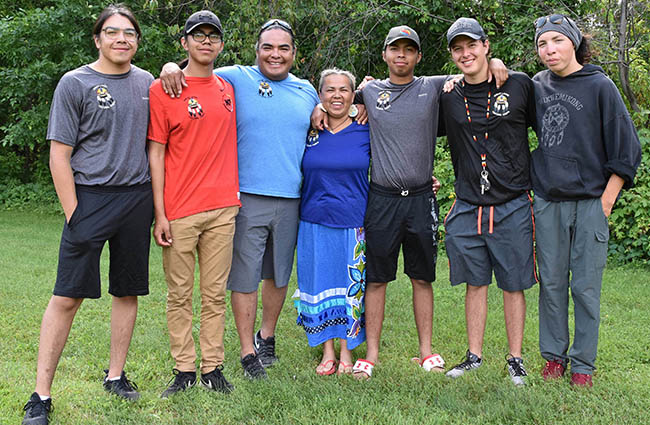Canadian Canoe Pilgrimage helped by Indigenous paddlers

By Kelly Anne Smith
NORTH BAY – A month long journey of reconciliation and healing came ashore in North Bay to a large gathering. The Canadian Canoe Pilgrimage landed at St. Joseph’s Motherhouse July 31.
Organised by the Jesuits as a direct action for reconciliation as per the TRC, the goal of the Canadian Canoe Pilgrimage has a dedicated group of people immersed in each others’ customs and traditions for an entire month.
So far about 86 paddlers have ridden the waves together on the route first used by people of First Nations who showed it to French explorers and missionaries.
After the 850 km trip in 135-kilogram canoes, the group of Indigenous, Jesuit, English and French Canadian paddlers will finish in Kahnawake First Nation near Montreal on Aug.15.
About 200 people attended the opening ceremonies and information booths at The Sisters of St. Joseph of Sault Ste. Marie Motherhouse. Dignitaries included Sister Priscilla Solomon. Esteemed Elder of Nipissing First Nation Evelyn McLeod prayed to have dignity restored to every single person affected by the Indian Residential School system. Virginia Goulais offered to smudge to every participant.
Tyler Eagle, Blair Beaucage and Tory Fisher of Moose Bay Singers sang. There were cultural events throughout the day.
Organizer Eric Sorensen is a Jesuit Volunteer with the Society of Jesus. “This really creates change as I think change moves at a personal level. If we’re going to have reconciliation here in Canada with Indigenous, Métis, and Inuit, it really has to start with a personal connection.”
The group travels about 30 km a day. Sorensen says they stop in at various communities along the way to raise awareness for reconciliation such as Mattawa, Deep River, and Ottawa.
There has been a core group of between 30 to 48 paddlers who are having a positive reaction to the pilgrimage.
The navigator of the trip is Paul Jacques. He has a strong background in orienteering and has affiliations with Michipicoten First Nation near Wawa. Jacques sees the trip as a progression on the path to reconciliation.
He says strong bonds are being formed on a personal and a community level. “It seems like everyone has different skill sets to bring to the table at the right time and friendships are being made.”
Jacques has noted the open communication among the paddlers has brought up difficult discussions.
“There are times to take breaks and rest. And during these moments people discuss their opinions and views in what is usually an informative session. There is a gentleman, Winston McKay, who was part of the residential school system. He talked about situations that were very uncomfortable. That’s part of the healing, finding out the truth. And we are speaking on our indifferences.”
The Jesuits formally acknowledged their role in the harm done to Indigenous children in Canada’s Indian Residential School system four years ago.
Jacques is positive about the future. “We are moving forward on the 94 actions of the Truth and Reconciliation Commission. I’m really enjoying myself because every day I see it being fulfilled.”
Jacques says the surrounding environment on the trip has been phenomenal.
“There was a bit of a struggle at the tail end of Georgian Bay but for the most part it’s been a great experience.”
Although Jacques is the navigator, he has had help with some tough parts of the route. An entrepreneurial family of paddlers from Wikwemikong First Nation ensured safe passage for the Canadian Canoe Pilgrimage. The Great Lakes Cultural Camps was instrumental in guiding the pilgrimage through rough waters around Mattawa rapids.
Great Lakes Cultural Camps (GLCC) is a Shawanda family run business specializing in indoor and outdoor experiential learning activities.
They offer First Nation cultural experiences, stewardship guidance and certifications in canoeing, kayaking, and backcountry rescues.
Bernadette and Maheengun say they are advocates for listening and understanding on the journey of reconciliation.


